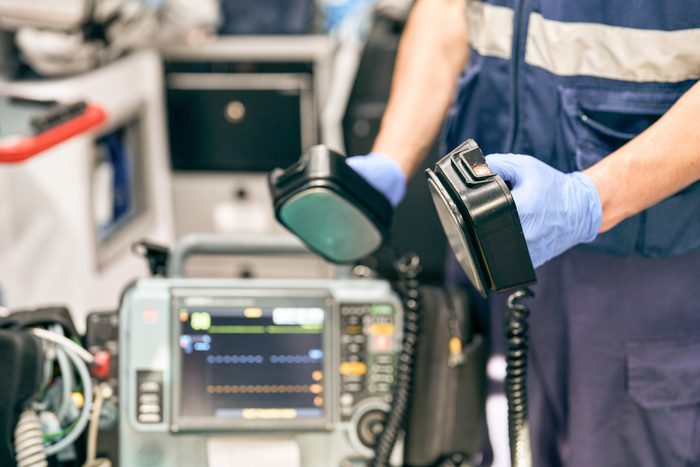This One Symptom Could Warn of Cardiac Arrest in 24 Hours
Updated: Jun. 06, 2024

New research suggests that telltale symptoms may appear before cardiac arrest, and knowing how to recognize them can be lifesaving.
Nine out of 10 people who experience sudden cardiac arrest outside of a hospital setting die—often within minutes. One of the reasons that cardiac arrest is fatal is that it is thought of as coming on suddenly without warning.
But new research suggests that telltale symptoms may appear before cardiac arrest, and recognizing them can give folks more than a fighting chance.
For men, the main symptom before cardiac arrest is the unexpected onset of chest pain, and for women, it’s the unexpected onset of shortness of breath. These signs may occur 24 hours before sudden cardiac arrest. according to a new study in the Lancet Digital Health.
“Fully 50% of men and women report these warning symptoms before cardiac arrest,” study author Sumeet Chugh, MD, tells The Healthy @Reader’s Digest. He is the Pauline and Harold Price Chair in Cardiac Electrophysiology Research, medical director of the Heart Rhythm Center in the Department of Cardiology, and director of the Division of Artificial Intelligence in Medicine in the Department of Medicine at the Smidt Heart Institute of Cedars Sinai in Los Angeles.
Cardiac arrest occurs when the heart unexpectedly stops pumping blood. Cardiac arrests are caused by certain types of arrhythmias or heart rhythm abnormalities that prevent the heart from pumping blood. (Here’s what happens when your heart stops beating.)
The first sign of cardiac arrest is often a loss of consciousness, and from there, people are on the clock. There’s a 10% chance of death for every minute that goes by, and within 10 minutes, most people will be dead, he says.
Recognizing early warning signs, however, could dramatically improve a person’s odds of survival.
Dr. Chough and colleagues looked for individual symptoms and sets of symptoms before sudden cardiac arrest and compared these findings to those of people who also sought emergency medical care but did not have a cardiac arrest. They conducted similar studies in Ventura County, California, and Portland, Oregon.
Fully 50% of the 823 people who had a sudden cardiac arrest witnessed by a bystander or emergency medicine professional in California experienced at least one telltale symptom 24 hours previously, and the Oregon-based study showed similar results.
Most people just blow off these symptoms, but calling 911 can be a lifesaver, he says.
“Only 20% of people experiencing these symptoms before cardiac arrest call 911, but they had a six-fold higher survival than the 80% who don’t,” he says.
Heart Attacks Might Be Preventable with This Chinese Medicine Exercise, Says TikTok—So Does It Work?
More than just symptoms
Warning symptoms matter, but not all cases of chest pain or shortness of breath are harbingers of cardiac arrest, he notes. “We have to combine other features with warning symptoms to help people understand if they are likely experiencing a cardiac arrest and need help right away,” he says. These may include high blood pressure, diabetes or other underlying diseases, he says.
If you experience an unexpected onset of chest pain or shortness of breath, seek urgent medical care, especially if you have known heart disease, he says.
Bystander CPR saves lives, he says. “We need the public to learn CPR and how to locate and use an automated external defibrillator (AED).” Such quick action is why Lebron James’ son, Bronny James, and NFL player Damar Hamlin survived cardiac arrests.
Knowing the early warnings symptoms of cardiac arrest may save lives, says Deepak L. Bhatt, MD, MPH, the Director of Mount Sinai Heart and the Dr. Valentin Fuster Professor of Cardiovascular Medicine at the Icahn School of Medicine at Mount Sinai in New York City. “There may be an incorrect belief out there that sudden cardiac arrests never have any symptoms, but a proportion of them do have warning symptoms, as seen in this study,” he tells The Healthy. “And in those cases, it could potentially have been lifesaving to call 911 as soon as those symptoms, such as chest pain, started instead of waiting.”

















